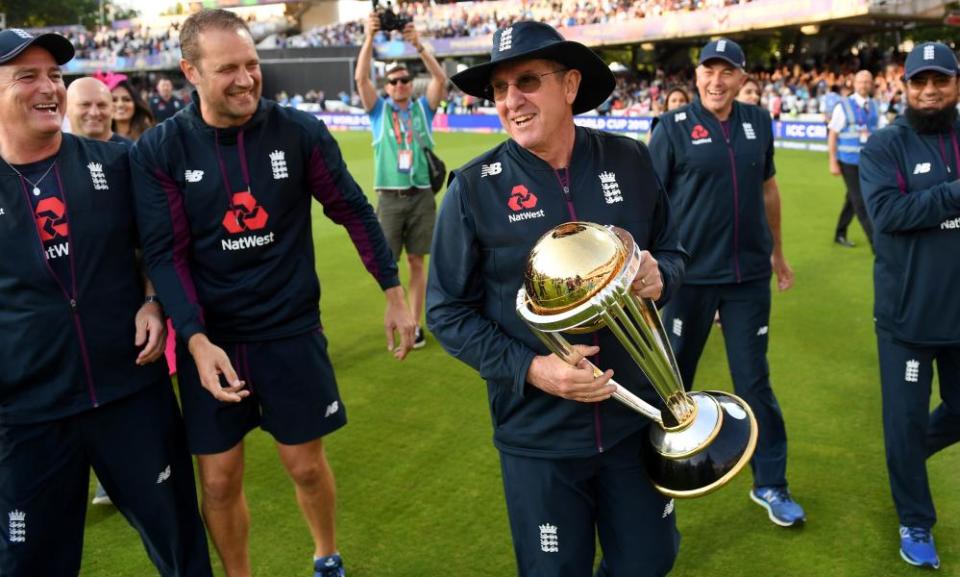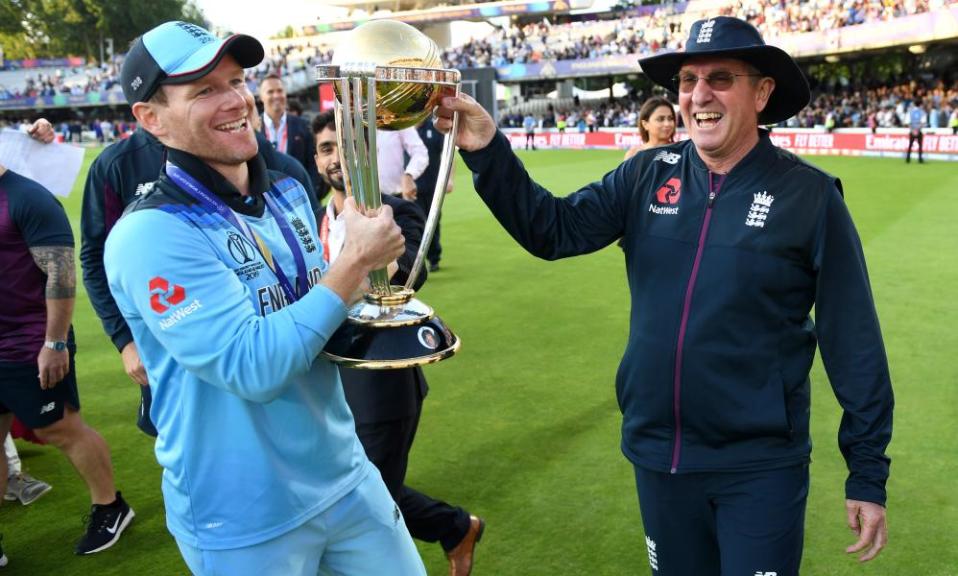Trevor Bayliss: 'Winning the World Cup still gives me goose bumps'

The pandemic prevented Trevor Bayliss from collecting his OBE last month but the World Cup-winning former England coach – a phrase the man himself would take serious issue with – is more worried about its impact on the English game at the start of our chat about the victory’s first anniversary.
“It’s just so unfortunate,” says Bayliss, from his home in New South Wales. “I was looking forward to seeing if there would be an uptick in interest, people playing cricket off the back of the World Cup. It’s hit everyone around the world but this Covid thing really came at the wrong time for the game in England.”
This concern may surprise a few who viewed the country’s first Australian coach as a detached figure during the best part of five years spent dodging the spotlight and hiding under a floppy sun hat and dark glasses. A relentless schedule prevented much contact with county cricket – inquiries about new players were nearly always met with an unknowing shrug – but Bayliss was never uncaring.
Related: England win Cricket World Cup after super-over drama against New Zealand
And so while the visit to Buckingham Palace may have been postponed – he and Eoin Morgan were due to receive their gongs on the same day, before taking in what should have been the first Test at the Oval – do the letters that already sit after the 57-year-old’s name now make him an honorary Pom?
“Ha ha, I hate to say it, mate, but there’s always going to be a soft spot for England,” he replies. “There were ups and downs along the way but overall I look back on a fantastic time. All the young Aussie cricketers who go over to England every year, you never hear any of them come back and say they’ve had a shit time. It’s just a great place to be in summer when the cricket is on.”
Bayliss should currently be taking in his own country with his wife, Julie, having planned a trip to the Northern Territory, the Red Centre and Western Australia – places he has never seen, bar Perth for cricket – after completing what was meant to have been a first season with Sunrisers Hyderabad in the Indian Premier League.
Instead the global pause has seen him pottering at home, playing a spot of golf and, like many of us, losing track of time. My initial text message a fortnight ago was met with shock that it is 12 months since that giddy day at Lord’s, when Jos Buttler demolished the stumps and England were crowned the world champions.

Not that he hasn’t thought about it plenty since. “People ask about the World Cup a lot, mates down the golf club, that sort of thing. And a rerun appeared on Foxtel here during lockdown, so I recorded it. I’ve watched it about four or five times since; it still gives me bloody goose bumps to be honest,” he says.
A hallmark of Bayliss’s tenure was being a picture of calm during pressure moments – “I’m like a duck paddling quickly under the surface,” was always his stock reply– but before our call I asked Chris Woakes how the coach fared during that gut-wrenching second-innings run chase.
The answer came back that Bayliss was “pretty casual, to be fair”, bar that one mind-bending moment of drama with three balls of the regular match to go when Martin Guptill’s throw from the deep struck the bat of a diving Ben Stokes for four of the most famous overthrows. “He was roaring the ball on to the boundary rope,” Woakes said.
“Nah, mate, I knew straight away,” Bayliss counters, when I put this to him. “We all just stood up to see if there was a fielder in that corner but I knew it had good pace on it and thought there is no chance anyone is chasing that down.”
And the fact that, by the letter of the law, it should have been five runs, not six? “It was unfortunate for New Zealand. But 99% of people thought it would be an extra four runs and so definitely six in total. Ask any cricketer who says they think it should have been five, they’re almost lying.

“How many times have we seen someone go back for a second run and then there’s an overthrow? It’s three. Who goes back to check when the ball was released? First-class cricket, they just say two plus one and on we go.”
Bayliss describes the decision to select Stokes and Buttler for the super over “a nonevent. Stokes was well set and Buttler, well, we all know how talented he is.” But he accepts asking Jofra Archer to close it out with the ball, only 73 days after his England debut, was a “massive call” by Morgan.
“It just shows the confidence and talent Jofra has got,” Bayliss says. “He’s got some ability, that’s for sure. I’d hardly seen him before but that ODI at the Oval earlier in the summer [when Archer bowled four overs of heat before rain fell] it was just: ‘Yeah, wow.’ And: ‘Imagine what he can do with a red ball in his hand.’
“You can gauge the reaction from the players. Not just the opposition but teammates. They know when they’ve seen something special. With Jimmy Anderson and Stuart Broad coming to the end [in Tests], you were always wondering who would be the ones to take over. When Jofra came on the scene it was a case of: ‘Well, there’s one.’”
After only five or 10 seconds I walked back inside. I just needed to be alone. Relief – that was the feeling
Bayliss recalls the moment when the tied super over saw England victorious on boundary countback and the emotions that followed. “Our media manager, Danny Reuben, filmed the balcony from inside the dressing room and I’ve watched it back. The thing that stood out for me at the time was coaches like Colly [Paul Collingwood] and [Graham] Thorpe jumping around like schoolkids. That said a lot to me about how much it meant, not just to the players out in the middle but to those who went before them. But then after only five or 10 seconds I walk back inside.
“I just needed to be alone, to get away from it. Relief – that was the feeling. It was just such a relief. After everything, all the planning with [former director of cricket] Andrew Strauss, Morgan, the selectors. The fact I’d been brought in to try and help England win the World Cup. It was justification for everything we’d spoken about having come to fruition. It was such just a relief that it worked.”
This acknowledgement of England’s primary reason for hiring him in 2015 was something Bayliss played down in the job. A former batsman for New South Wales, red-ball cricket – and the Test cricket he never quite played – is his first love. But considerable white-ball success when coaching his state, Sydney Sixers, Sri Lanka and Kolkata Knight Riders caught the eye of Strauss.
Bayliss bridles at the notion of silverware ever going against the name of the coach, however. Before an interview for Sky Sports one time, Rob Key told Bayliss and his number two, Paul Farbrace, he wanted to ask about the trophies they had won as coaches only for Bayliss to cut him dead with: “I’ve won nothing mate, it’s the players.”
And on the lap of honour at Lord’s he flatly refused to hold the trophy until Morgan thrust it into his hands. A split second later, as if a vector of disease, the World Cup was on the grass. Success, he has long insisted, is not for the coach to claim.
Strauss, knowing England’s white-ball talent pool was deep but underperforming, was looking for this quality; a low-ego facilitator to set a relaxed tone and be an antidote to the perhaps more intense regimes of Andy Flower and Peter Moores. Bayliss, a gnarled yet avuncular Australian with a dry, quirky sense of humour, fitted the bill.
“You have to read the environment,” Bayliss says. “One of the things we set out to do right at the start was let the players explore the ceiling. How good could they be? But it was done knowing full well that, without telling anyone, we’d have some stumbles along the way and we’d cop some criticism for it. Which we did.
“But in the long run they learned from that and were able to adapt to the wickets in the World Cup, which were a lot different to the flat ones of the previous four years. Ultimately they were good enough to do it.”
In fairness the blowouts, though spectacular, were fleeting, with England spending the best part of four years in ODI cricket outgunning their rivals on pretty much every metric, be it wins, run rate, fours, sixes, 300-plus totals (including two world records) or chases. But Bayliss knew early on he was working with potential champions.
“The calibre of player and ball-striking ability; normally in a good team, you might have two or three really top-class guys,” he says. “We had seven who could score a hundred off 50 balls. That was one of the things that allowed them freedom to keep playing. With seven guys like that, keep doing what we’re doing and two will come off out of the seven. In that final it just happened to be Stokes and Buttler.”
The Bayliss approach is to empower the captain – “I’m old school. The captain is the one in charge. That gets said a fair bit but without it maybe being the case” – and knows in Morgan he struck gold. But there was one moment during the World Cup, after England thrashed Australia in the semi-final, when he felt moved to intervene.
“I let them enjoy it,” he says, “but after a while they, well, they weren’t enjoying it too much but I just wanted to cut it short so they didn’t over-celebrate. I put my Aussie hat on and said something like: ‘You want to know why Australians think you don’t win anything? It’s because after a semi you think you’ve won it. Well you haven’t won anything yet. The one that counts is the next one.’
Related: England win a World Cup … and for once the nation really was watching | Barney Ronay
“It went pretty quiet and I think the message did hit home. Suddenly they started talking about doing the right things to prepare for the final.”
This is one example of the homespun less-is-more approach that Bayliss vowed never to change on accepting the job. It served England well when the train threatened to go off the rails – be it Morgan and Alex Hales declining a Bangladesh tour, the Bristol incident or the removal of Hales before the World Cup – so too his choice to absorb as little cricket media as possible.
“There were times when I didn’t enjoy having to front up after defeat but that’s part of the job. Mate, I still don’t know which paper you write for,” he says, laughing. “But win, lose or draw, I just had a great time. The people I met and the friendships will be with us for the rest of our lives. If that was the worst thing to come out of it, we’re doing all right.
“Hopefully the ECB are able to recapture some of that feeling from the World Cup. It would be great if there was a little uptick from it.”
One year on, he’s not wrong.

 Yahoo Sport
Yahoo Sport 





































